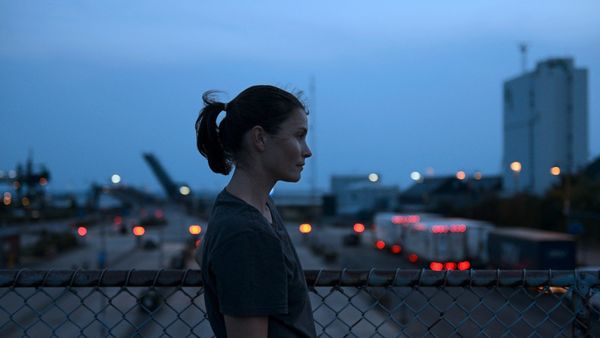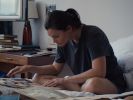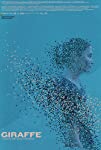Eye For Film >> Movies >> Giraffe (2019) Film Review
Giraffe
Reviewed by: Anne-Katrin Titze

Anna Sofie Hartmann’s debut feature (produced by Toni Erdmann director Maren Ade) starts out with three giraffes (giraffes have a cinematic moment right now - see David Fincher’s Mank), one of them chewing languidly, and staring right into the camera (cinematography by Jenny Lou Ziegel). The animals will not appear again. This is not their story, but that of a human transplant, ethnologist Dara (Lisa Loven Kongsli of Ruben Östlund’s Force Majeure and Tamara Jenkins’ Wonder Woman). She takes a temporary job on the Danish island of Lolland, where she collects for the local museum (Christian Petzold’s Undine, starring European Film Award winner Paula Beer, may come to mind) interviews and objects that will archive the drastic transitions about to take place with the building of a tunnel connecting Denmark and Germany.
She visits real-life locals Leif and Birte Nielsen for coffee and cake to record their story. They speak about the history of their farm, which goes back to 1927, and how their hope it would stay in the family for more than three generations will not come true. Birte tears up - her three kids were born there - and she already imagines the future pain it will cause to drive by the construction site. This at heart is a film about the mourning of what still is, but too soon will once have been.

Dara, whose 'regular' life is in Berlin, speaks on the phone to her boyfriend there, chats with her mother, eats mostly alone in her hotel room. We see roads and water; a nightly thunderstorm at sea erupts in bursts of orange. Found objects - a spoon, a tile, a pin cushion, a wooden laundry pin - once useful and beloved - are catalogued and stored away for future unearthing.
She is 38 when she meets 24-year-old Lucek (Jakub Gierszal, the son in Frauke Finsterwalder’s Finsterworld) who works on Lolland with a Polish construction crew. Despite their different backgrounds, the two get to know each other. She reads Rebecca Solnit’s A Field Guide to Getting Lost, a book she says is about “places and memories.” As we cannot go back in time, “places are what remains.”
We get a look at more of the locals and what they will leave behind. At an abandoned farm, Dara finds the remnants of the life of a librarian, Agnes Sørenson, who lived there alone - her books, her photographs and a diary that reads as if it were written in Haikus as “a quiet rain falls.” The woman (in pictures she looks like a cross between longtime Fassbinder actress Irm Hermann and my high school French teacher) clearly casts a spell from the past.
Käthe (Maren Eggert), who works on the ferry, imagines thoughts and entire biographies for the travellers she observes. During a quick weekend trip back to Berlin, Dara seems out of sorts. Neither her boyfriend (Daniel Hoevels), nor the play one of their friends performs in (Christoph Bach, who played Jakub Gierzal’s teacher in Finsterworld), nor the conversations and lunch with their circle seem to reach her.
Remnants of bygone ways of life are beautifully shot in Giraffe (FIPRESCI Best Film winner in the 2019 Vienna International Film Festival and a 2020 New Directors/New Films highlight, screening virtually nationwide in the US through Friday, December 18), which is enriched by its mix of fictional and documentary elements. When buildings are demolished, a bit of the soul of a place goes with them. Wallpaper collects time and the twinkling lights of the ferry that was good enough for so long will soon be of the past. Rocks in a field remain when decisions of how to live in the present are being made. How to live? is the question being asked by people on an island in limbo and it resonates beyond the screen.
Reviewed on: 18 Dec 2020















